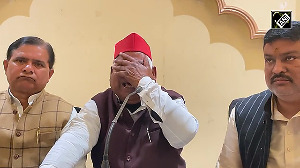A football festival in the English city of Liverpool has given a kick-start to the aspirations of Indian players hoping to make the grade.
Last week's AsiaEurope Football Festival brought Indian players together for the first time with English talent scouts looking for the next Asian Beckham.
Courses in playing, coaching and management were also highlighted during the festival, supported by the UK Football Association (FA) and the Professional Footballers Association, who implicitly recognise that British football has so far failed to tap the large pool of available Indian and South Asian talent.
Among those who lent their name in support of the festival is Arsenal and England centre-back Sol Cambell, who says football must be open to everyone regardless of their ethnicity.
Campbell, who is black, adds, "I look forward to the time we have an Asian player playing in the Premier League and competing with the best."
All this may happen sooner than later thanks to the efforts of festival organiser Majid Lavji, who has made it his life's ambition to boost the presence of Asian footballers in the UK and give them the same profile they have in other sports like cricket.
Uganda-born Lavji is the first to admit there is no Nasser Hussain or Mark Ramprakash in football, but, as he points out, cricket has a much higher profile in the subcontinent and is considered a major sport.
That is why Indian cricketers, along with Bhangra and Bollywood, have imprinted themselves on the hearts and minds of audiences all over the world in a way that cannot be said of their football counterparts.
But Lavji, who presided over a football festival that brought together 100 teams from all over the UK, says the talent scouts who attended the event were extremely excited by what they saw.
"We were supported by Premier League clubs and talent scouts who have already identified players with potential," he told rediff.com.
By this time next year his company expects to have three football coaching centres in the cities of London, Preston and Derby with the specific remit of encouraging South Asian players.
"Every centre will stage mini competitions that will filter through to the national competition in Liverpool," he explained.
Lavji is the first to concede that racism within British football has prevented the South Asian ethnic minority from breaking into the game to match the black players who have succeeded at the national level.
Currently, some 20 per cent of all professional English footballers are black but the statistic for South Asians is negligible. In fact, the number of such players in the top Premiership league can be counted on the fingers of one hand.
Added to this is the absence of South Asian referees and coaches in top flight professional teams, which means the community is left to participate at the grass roots level, relegated to playing in non professional 11-a-sides or in small community organised five-a-side tournaments.
"There is enough evidence that Asians are interested in football," says Leon Mann of the anti racist Kick It Out campaign. "But the reason why you don't find more Asian players and leagues is that they fear verbal and physical harassment.
"You also have a lot of stereo typing, so people say things like, 'They're not tall enough, they're not strong enough, they've got different dietary habits'. Black players used to face the same problems, but they persisted and now they've broken through.
"Liverpool was a really positive step towards showcasing Asian football talent from different communities. Certainly, it shows that the FA and local clubs are aware that there are a lot of good players from the Asian community who haven't been given the chance to participate in football on a player level and in coaching and refereeing."
Birmingham football development officer Naim Naguthney says persistent racism puts off the Indians, although in his opinion, the best football players in three world are either black or brown.
Naguthney, who was born in Mumbai, says, "People used to give us a hard time calling us 'Pakis'. Black players also had a hard time with people throwing bananas at them. The difference is they didn't give up."
Harpal Singh is one of three South Asian footballers who have made it to professional level along with Michael Chopra and Anwar Uddin.
Singh, 21, who was the first Asian player to be signed up by top Premiership team Leeds United says he is pleased to see the FA lending their support to the Asian football cause, adding, "The Asian community has been crying out for something like this for a long time."
"It gives them a chance to get involved at many levels of the game, from playing through to coaching and refereeing.
"The fact that many of the top clubs, managers and organisations like the FA are backing this will only encourage more Asians to realise there are more opportunities out there for them in football."
He points out that lack of support from clubs and football organisations in the past has made Asians feel they were not wanted, making it harder for them to break into mainstream leagues.
"Asians need to receive the backing from their families," Singh says. "If I hadn't received the support from my family from a really young age, I wouldn't be where I am today. They helped me all the way from taking me to training to regularly watching me play.."
He also says that in his experience Asian players find it harder to mix in with the white players than the black children do.
"If Asian players are used to playing only with other Asians, they find it harder to come along to trials and participate in predominantly white games," says Singh.
He believes the solution lies in involving children at a sufficiently young age so they integrate more quickly and get used to playing with different people. He himself was a young boy when he started playing at Leeds and after a while he blended in.
"I grew up with other lads around me and they got used to me," Singh explains. We need to encourage this - if we don't then Asian youngsters may have the football talent but not the football know how."
Permi Jhooti, a 32-year-old former professional woman footballer who used to play for the London club Fulham and Chelsea, agrees with Singh that and says Asian football and footballers have been very isolated.
She says role models are terribly important and Asian families are hesitant about supporting their children because they have no Asian footballer they can relate to.
On the other hand, Asian family priorities have always been very different from those of the white and black communities.
"The first generation of Asians wanted to work hard and survive," Jhooti says.
Education was a priority for the third generation and all sport was seen as a hobby. The third generation who have made a success of themselves now have time for sport.
"In my generation, sport was something you did after everything else, after your studies and other important things, and it really wasn't taken seriously. Now is the time to push forward."
The Football Association says it is delighted with the success of the AsiaEurope Football Festival and hopes it will lead to the first Asian football academy being opened in the UK.
"We are happy to lend support to the development of football tournaments and to point people in the right direction for fundraising for new facilities and to showcase new talent," says spokesman Alex Stone.
"Previously the FA may have been perceived as an inaccessible body, but with the introduction of initiatives like football development officers we were able to work with clubs and schools on a grass roots level and to encourage levels of participation as well as raising footballing standards across the board."







 © 2025
© 2025